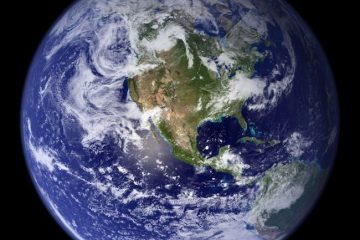Embark on a journey into the fascinating realm of Gaia philosophy, a theory that unravels the intricate tapestry weaving together all living beings and the planet we call home. Delve into the depths of this captivating philosophy that explores the interconnectedness of Earth’s ecosystems and the notion of our planet as a self-regulating organism. Join us as we unravel the threads of Gaia theory, offering a fresh perspective on our relationship with the natural world and our role in its harmonious balance.
Table of Contents
- Understanding Gaia Philosophy: A Holistic Approach to Earth
- Exploring the Interconnectedness of Nature and Humanity
- Implementing Sustainable Practices Inspired by Gaia Theory
- <a href="#embracing-gaia-philosophy-for-a-greener-future“>Embracing Gaia Philosophy for a Greener Future
- Q&A
- To Wrap It Up

Understanding Gaia Philosophy: A Holistic Approach to Earth
Embark on a journey into the depths of Gaia philosophy and explore its encompassing view of the Earth as a living system. This holistic approach emphasizes the interconnectedness of all living beings and the planet itself, promoting harmony and balance in our interactions with the environment.
Within the realms of Gaia philosophy, the Earth is perceived as a self-regulating organism where all components, from the atmosphere to the oceans to the forests, work together in a delicate equilibrium. By acknowledging and respecting this interconnected web of life, individuals can cultivate a profound sense of environmental stewardship and interconnectedness with nature.

Exploring the Interconnectedness of Nature and Humanity
In the intricate web of existence, the concept of Gaia philosophy delves into the profound connection between nature and humanity. This holistic approach emphasizes the interdependence and symbiotic relationship between all living beings on our planet. Just as the roots of a tree nourish its branches, so does the harmony between nature and humanity sustain the delicate balance of life on Earth.
Key Points to Consider:
- Nature as a living organism
- Humanity’s impact on the environment
- Eco-centric worldview
- Interconnected ecosystems
As we embrace the principles of Gaia philosophy, we come to appreciate the beauty and resilience of our planet. By acknowledging our role as stewards of the Earth, we can work towards fostering a sustainable coexistence with nature. Let us nurture this interconnectedness with reverence and responsibility, ensuring a harmonious future for generations to come.
Implementing Sustainable Practices Inspired by Gaia Theory
Sustainable initiatives grounded in Gaia Theory encourage a holistic approach to environmental conservation. By embracing interconnectedness and balance, businesses can adopt practices that benefit both the planet and their bottom line. Implementing sustainable strategies not only reduces ecological footprints but also fosters resilience in the face of global challenges.
To translate Gaia Theory into actionable steps, organizations can prioritize renewable energy sources like solar and wind power. By investing in clean energy technologies, companies align with the Earth’s natural systems, reducing reliance on finite resources. Additionally, promoting biodiversity through green spaces and wildlife habitats supports the interconnected web of life, contributing to healthier ecosystems. Table:
<table class="wp-block-table">
<thead>
<tr>
<th>Key Elements of Sustainable Practices</th>
<th>Benefits</th>
</tr>
</thead>
<tbody>
<tr>
<td>Renewable Energy</td>
<td>Reduces carbon footprint and energy costs</td>
</tr>
<tr>
<td>Biodiversity Conservation</td>
<td>Fosters resilient ecosystems and supports natural habitats</td>
</tr>
</tbody>
</table>
```<br/><br/><div class="automaticx-video-container"><iframe allow="autoplay" width="580" height="380" src="https://www.youtube.com/embed/32ohRi9AehM" frameborder="0" allow="accelerometer; autoplay; clipboard-write; encrypted-media; gyroscope; picture-in-picture" allowfullscreen></iframe></div><h2 id="embracing-gaia-philosophy-for-a-greener-future">Embracing Gaia Philosophy for a Greener Future</h2><div class="post-section">
<p>In the realm of environmental consciousness, Gaia philosophy stands as a beacon of hope, guiding us towards a harmonious relationship with our planet. It encapsulates the idea of Earth as a living organism, interconnected and interdependent, fostering a sense of respect and responsibility towards nature.</p>
<p>By embracing Gaia philosophy, we embark on a journey of sustainability, advocating for practices that nurture the Earth rather than exploit it. This holistic approach encourages us to view the planet not just as a resource to be consumed but as a precious entity deserving of our care and protection.</p>
</div> <h2 id="qa">Q&A</h2>Q: What is Gaia philosophy theory and how does it differ from traditional environmentalism?
A: Gaia philosophy theory, also known as Gaia theory, proposes that the Earth is a self-regulating organism where living and non-living components interact to maintain the conditions necessary for life. This theory, developed by James Lovelock in the 1970s, suggests that the Earth functions as a single, complex system akin to a living being, which can adapt and regulate itself over time.
Q: How does Gaia theory view the relationship between humans and the environment?
A: In Gaia theory, humans are considered integral parts of the Earth system, with the capacity to either enhance or disrupt the delicate balance of nature. The theory emphasizes the interconnectedness of all living beings and the environment, highlighting the importance of sustainable practices to maintain the health and well-being of the planet.
Q: What are some practical implications of Gaia philosophy theory for environmental policy and conservation efforts?
A: Gaia philosophy theory advocates for a holistic approach to environmental issues, encouraging a shift towards sustainability, biodiversity conservation, and ecological restoration. By recognizing the Earth as a unified system, this theory promotes a deeper understanding of the interconnectedness of nature and the importance of preserving the balance of ecosystems for future generations.
Q: How has Gaia theory influenced scientific thinking and environmental ethics?
A: Gaia theory has inspired interdisciplinary research in fields such as ecology, climatology, and systems science, stimulating discussions on the interconnected nature of life on Earth. This theory has also contributed to the development of a more profound sense of environmental ethics, urging individuals and societies to adopt more responsible attitudes towards the planet and its resources.
Q: What are some criticisms of Gaia philosophy theory, and how has it evolved since its inception?
A: Critics of Gaia theory point to its anthropocentric tendencies and the challenges of applying a holistic perspective to complex environmental issues. Over time, the theory has evolved to incorporate feedback from various disciplines and refine its concepts, leading to a more nuanced understanding of the Earth as a dynamic and interconnected system. <h2 id="outro">To Wrap It Up</h2>As we conclude our exploration of Gaia philosophy theory, we have delved into the intricate web of interconnectedness that defines our relationship with the Earth. From the symbiotic dance of ecosystems to the profound unity of all living beings, the essence of Gaia philosophy resonates with a deep reverence for the planet we call home. Let us continue to nurture this harmony, embracing our role as stewards of Gaia and honoring the delicate balance that sustains life. May our journey towards understanding and appreciating the interconnected tapestry of existence guide us towards a future rooted in respect, compassion, and kinship with all living things. Thank you for joining us on this enlightening quest through the realms of Gaia philosophy theory.


0 Comments